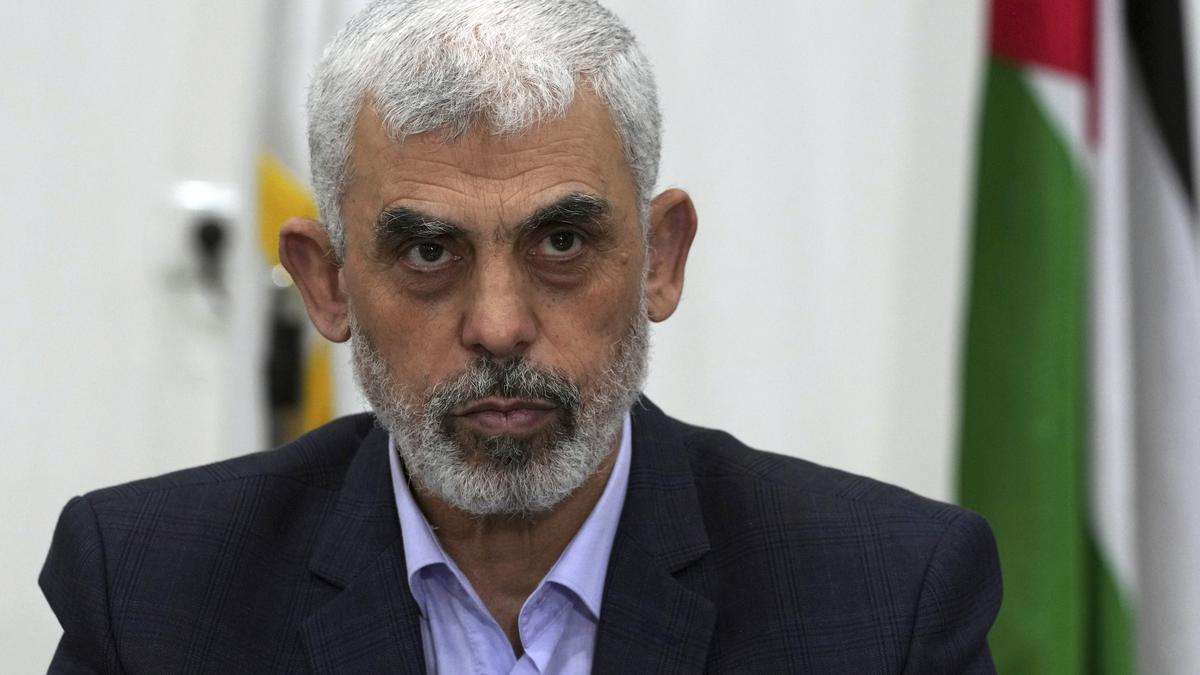
Who was Yahya Sinwar?
The Hindu
Death of Yahya Sinwar: A year later, after killing over 42,000 Palestinians, a vast majority of them women and children, the Israeli Defence Forces announced that it has killed its most wanted man in an operation in Gaza’s Rafah
Immediately after Hamas’s October 7, 2023 attack in Israel, in which about 1,200 people were killed, the Israeli Defence Forces (IDF) called Yahya Sinwar, the leader of the Islamist militant group in Gaza and the key architect of the attack. “a dead man walking”. A year later, after killing over 42,000 Palestinians, a vast majority of them women and children, and turning much of Gaza into rubble, the IDF announced on Thursday (October 17, 2024) that it has killed its most wanted man in an operation in Gaza’s Rafah.
Also read: Israel’s Foreign Minister confirms that Hamas top leader Yahya Sinwar was killed in Gaza
Born in a refugee camp in Khan Younis in southern Gaza in 1962, fourteen years after the state of Israel was created, Sinwar grew up under foreign occupation – first Egyptian and then Israeli. His parents were from Al-Majdal, a town north of Gaza today known as Ashkelon in Israel proper, from where they were forced out when the state of Israel was created in 1948. Some 7,00,000 Palestinians were made refugees between 1948-49, in what they call Nakba (catastrophe). The Sinwars fled south towards Gaza.
Sinwar became active in the Muslim Brotherhood in the 1980s and was first arrested by Israel in 1982, when he was 19. When Hamas was founded in 1987, Sinwar established the group’s internal security organisation, al-Majd, which was accused of targeting several Palestinians “for collaborating” with Israel. Sinwar was a brutal enforcer of loyalty. In 1988, he was arrested by the Israelis, convicted for the murder of 12 Palestinians and sentenced for four life sentences. He spent 22 years in Israeli prisons. But prison never broke him. He once told a Shin Bet interrogator, “You know that one day you will be the one under interrogation, and I will stand here as the government, as the interrogator.”
A fluent Hebrew speaker, Sinwar was driven by his deep antipathy towards the Israeli occupation of Palestinian territories and deep commitment to the Islamist ideology of Hamas. The Israeli prison for him was a learning “academy”. He said he was “married to the Palestinian cause”. And violence defined his method, right from the days when he was hunting down the “collaborators”.
Sinwar was released in 2011 as part of a prisoner swap deal when Israel freed 1,027 Palestinian prisoners in exchange for one soldier, Gilad Shalit, who had been taken captive by Hamas in 2006. By that time, Hamas was already in power in Gaza, and Ismail Haniyeh was its leader. As a former internal security chief who spent two decades in Israeli prisons, Sinwar already enjoyed a cult status among Hamas’s top ranks. He rose quickly within the militant group, and established close links with Haniyeh, and Hamas’s foreign backers, including Hezbollah and Iran. In 2012, Sinwar travelled to Iran to meet Qassem Soleimani, the Quds Force commander who was assassinated by the U.S. in January 2020 Baghdad.
In 2017, when Haniyeh became the head of Hamas’s Polit Bureau. Sinwar was chosen as the group’s leader in Gaza. A year later, in an interview, Sinwar said his life as the administrator of Gaza, which had been under Israeli blockade since 2007, was not any different from the time he spent in Israeli jails. “I have only changed prisons. And, despite it all, the old one was much better than this one. I had water, electricity. I had so many books. Gaza is much tougher,” he said. This was also the time when Hamas showed signs of moderation. It had halted suicide bombing. Its updated 2017 charter had expunged the anti-Semitic remarks of its original charter. Hamas leadership also signalled that they would accept the 1967 border as part of a long-term ceasefire with Israel.













